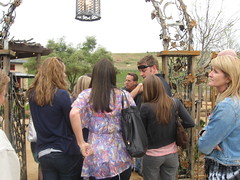Do you know about - South Africa trip Trips - Zulu, Xhosa, and Afrikaans Culture Facts
Wine Tours! Again, for I know. Ready to share new things that are useful. You and your friends.
When in Rome, do as the Romans do, so the saying goes, but when in South Africa, it can come to be quite difficult to result this with the vast amounts of languages and culture that exists here. A truly diverse nation in every sense of the word, South Africa boasts 11 valid languages and a multitude of cultures that have over time blended and mixed to originate a plethora of captivating features and people. The most widely spoken language in South Africa is of procedure English and this is the main platform for businesses and manufactures in the country. The other languages that are valid and that are gift in the relevant schools according the region they are located in are Afrikaans, Zulu, Xhosa, Venda, Tswana, Pedi, Tsonga, Swazi, Sotho, and Ndebele.
What I said. It isn't outcome that the real about Wine Tours. You see this article for home elevators a person want to know is Wine Tours.How is South Africa trip Trips - Zulu, Xhosa, and Afrikaans Culture Facts

Afrikaans is the languages derived from and still intimately linked to Dutch or Flemish. Most of the Afrikaans speaking habitancy are of Dutch decent, with some of the Cape Colored society also adopting this as their native tongue. In the farmland regions, Afrikaans is widely spoken and many African habitancy speak this as their second language as opposed to English. The culture of the Afrikaans / Dutch descendants stems mainly from the advent in South Africa. Jan Van Riebeeck was the first Dutchman to land on South African soil and from here more and more habitancy began to descent upon the peaceful, gorgeous and fertile land. Most of the Afrikaans habitancy are farmers and wine makers with Simon Van der Stel being the first person to insist that the Cape Wines could be bottled and sold to originate a booming wine industry.
The most illustrious symbol that Afrikaaners are linked with is the Voortrekker (pioneer). These were the first of the Dutch immigrants that set off to scrutinize the land of South Africa and fetch new frontiers. Women wore smaller versions of the winged Dutch caps while the men wore floppy felt or cowhide hats, and the rode in ox wagons. Music is very foremost in the Afrikaans society as is theater and most of the Afrikaans singers and musicians are best supported than the English singers.
The most favorite of the African tribal languages is Zulu and Xhosa. The Xhosa tribes come mainly from the Eastern Cape regions and this language is spoken more frequently in the Cape. The Zulus are found further North in the Gauteng and in the KwaZulu-Natal Province which is named after them. The Xhosa language is illustrious for its clicks which are used in speech. The clicks you hear are used for the letters c, x and q. In Zulu you will not have any clicks, although many of the words are similar. The legacy of the Xhosa habitancy lies very intimately with the political nature of South Africa as the illustrious Nelson Mandela is from Xhosa descent as is most of the Anc (African National Congress) party he formed part of. The current president, Thabo Mbeki is also Xhosa speaking. The traditional dress of the Xhosa habitancy is colorful with lots of beading, embellishments and patterns. They often wear ankle bracelets which are used for development sound effects while dance rituals and celebrations.
The Zulu tribe was very distinguished in the time of King Shaka and used to be the main tribe in the land. After the fall of Shaka and Dingaan, there have been less conspicuous Kings / Chiefs with the current Chief being Mangosuthu Buthelezi. The Zulu tribes formed the Ifp or Inkatha leisure Party while the Apartheid years and have a strong following. The Zulus are illustrious for their dress. They carry long spears and body length shields ordinarily covered in some kind of animal hide. They wear feathered head dresses and are characterized for their unique dancing style. This style was adapted by the Zulu mine workers to consist of some Western moves and Gumboot dancing is now a favorite dance form.
Beside the valid languages that are spoken there are lots of other cultures and religions that form part of South Africa. Muslims form a large part of the community, especially in the Western Cape. There is also a very large habitancy of Indian habitancy living in Durban and its surrounding towns with many Hindus and Islamic religions being recognized. You will also find a strong Jewish sector in most of the main cities in South Africa while other foremost nationalities consist of Italian, German, Portuguese, Lebanese, and smaller Chinese communities. Each nationality and religion is illustrious and not discriminated against in any way according to the new laws and cultural tolerance.
Cultural tourism is offered throughout the country now, as international visitors are eager to learn more about the different cultures and traditional African tribes that they were separate from while the Apartheid regime.
I hope you get new knowledge about Wine Tours. Where you can put to utilization in your day-to-day life. And most importantly, your reaction is Wine Tours.Read more.. South Africa trip Trips - Zulu, Xhosa, and Afrikaans Culture Facts. View Related articles associated with Wine Tours. I Roll below. I even have counseled my friends to help share the Facebook Twitter Like Tweet. Can you share South Africa trip Trips - Zulu, Xhosa, and Afrikaans Culture Facts.
No comments:
Post a Comment